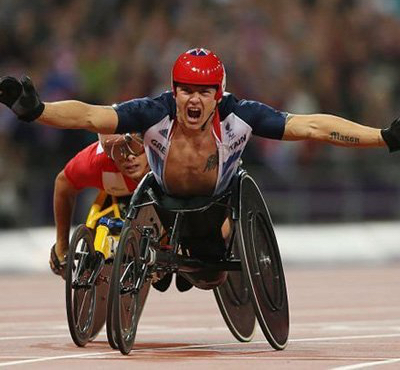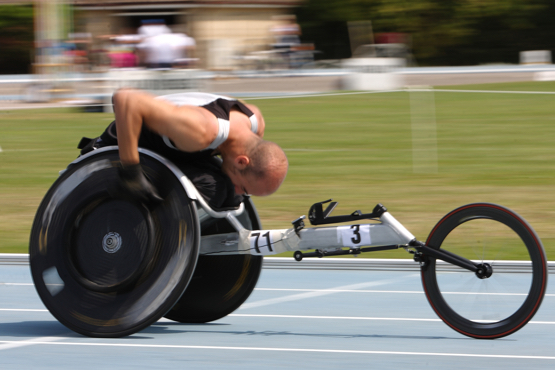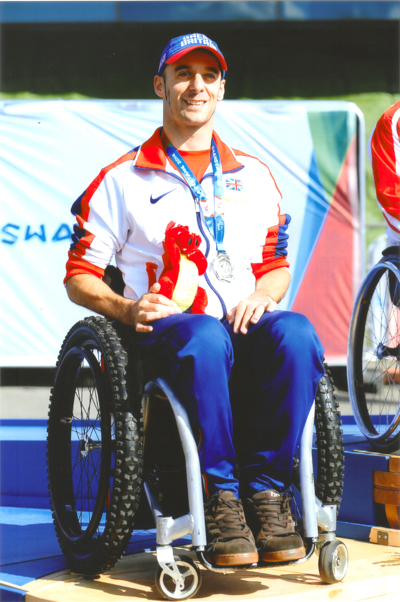Your basket is currently empty!
Focus on Sport: Wheelchair Racing
Sport is a well-known key contributor to leading a healthy and independent lifestyle and is arguably even more important to those living with a disability. Physical fitness, mental wellness and a community of like-minded people are just some of the benefits of taking a regular part in disabled sport, at any level. But what options are available to those with disabilities? In this article we take a look at one sport in particular: wheelchair racing.
What is wheelchair racing?
If you took an interest in the Paralympics, you may have heard of Hannah Cockroft or David Weir, both of whom are GB wheelchair racers and Paralympic champions.
Wheelchair racing consists of events on the athletics track as well as road races. Athletes compete at distances from 100m to full marathons. The sport takes place in specialist, 3-wheeled racing chairs, known as ‘track chairs’. At elite level, these chairs are custom-made to tailor the precise sitting position to the individual. But many clubs have used track chairs available for beginners to trial before getting their own made.
Who can take part?
Wheelchair racers are classified into categories based on their level of disability. They compete against other athletes with similar levels of function. This means that wheelchair racing is open to people with a wide range of disabilities. From spinal cord injuries and cerebral palsy, to amputees among others.
Rob Smith, director of Active Hands, has been competing in wheelchair racing for over 15 years. He has a spinal cord injury at C5/6 level (incomplete) and races at ‘T52’ category. From training just for fun at the beginning, to winning the T52 category London marathon in 2018, it is safe to say that wheelchair racing has become a huge part of his daily life. He would encourage anyone to try it out and enjoy the community that comes with it.
It doesn’t matter if your plan is to become an international marathon racer or just to improve your own fitness level or join in with your kids at the local park run or fun run, wheelchair racing is a great sport to get involved in.
Rob now trains twice weekly with his racing group, the Coventry GoDivas. He also trains on rollers at home most other days. Rollers are a great way to train for wheelchair racing at home and to work on your stamina. Rob also finds cross training with weights improves his performance and has huge benefits for his overall mobility. He is able to lift weights and access a wide range of gym equipment thanks to our gripping aids, which you can find here. This variety keeps him motivated and challenging himself and is a key part to getting the most out of sport.
Where can I train?
Clubs around the world meet regularly to train. Beginners and elite athletes generally train alongside each other: anyone is welcome. If you’re in the UK, you can find your local club by contacting the British Wheelchair Racing Association through their website or Facebook page. The association is the governing body for wheelchair racing in Great Britain and works to promote participation, equality and governance for disabled people on road and on track. They organise the annual National Wheelchair Racing Track Championships as well as regular tryout events, training weekends and camps.
What equipment do I need to get started?
A track chair is obviously an essential for getting started, but so are a helmet and some gloves (soft or hard, depending on lots of factors… your club can give you advice on this). It’s likely that your local club will have some basic or used track chairs for you to borrow if you would like to try out the sport before committing to your own race chair. This is also a good way to investigate what type of chair and seating position works best for you.
What are the benefits of wheelchair racing?
There are great benefits to taking part in sport regularly. Increased fitness helps in all areas of life and wheelchair racing is a great way to build strength and stamina. But the benefits are not just physical. There is also much research indicating the benefits of sport to mental health. The endorphins released during exercise, the process of goal-setting and achieving those aims as well as feeling your fitness levels improve, can all help you to improve your mental well-being. Finally, as Rob Smith explains, the communities built around disabled sport are a fantastic support network to become a part of.
Wheelchair racing has given me a huge amount of benefit over the years I have done it. As well as the physical benefits of continued exercise over many years, I get to train with a great group of other racers so the social side is encouraging and beneficial too. I have had the opportunity to compete in track and road races all over the country and the world. And even represent my country a number of times. Road racing I particularly love as there is a real spirit of community between international road racers. It is great to take part in huge international events in amazing places alongside able bodied competitors.



